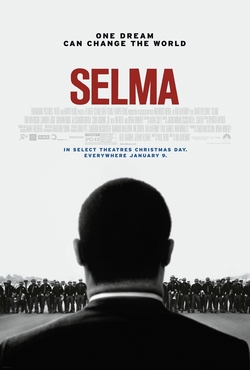Movies about the Civil Rights Movements
by Julia Yanosik
During the Peace Trip we watched two movies that particularly had a big impact on me. The first was Selma, and the second was called Faces in the Water. The film Selma was about Dr. King leading the march from Selma to Montgomery. What was so special about watching this movie was that we watched it at just the perfect time. We watched it as we were driving into Montgomery, where so much of what we were seeing in the movie happened, and where there were so many museums and memorials dedicated to civil rights activists. The film Faces in the Water was shown at the Civil Rights Memorial Center in Montgomery. The video was about forty people who were murdered for what they stood for, sometimes simply because they were black. The length of the movie didn’t matter. Even though it was only twenty minutes long, it made me so emotional in those twenty minutes.

That was one thing that these two movies had in common, it made you so emotional. Both movies also had so much suffering. They were both painful to watch, because you would think to yourself, this actually happened. Children died, families were torn apart, and while watching it you feel a pain in yourself that makes you half wish that you never watched the movie, but also brings an awareness to you. This was a painful part of our history. People died, and as much as you would like to look away, and pretend that it never happened, if you don’t watch, and you don’t pay attention, those people will have died in vain.
You have to pay attention to history, because it's how you learn from past mistakes, and make the present time better. I think that learning history is the biggest factor to making peace. That’s why I hate when I go to a museum or a monument, and I see other people looking on their phones, tickling their friends, running around like crazy people, or when I see other kids in school groups acting as if they are only there because their teachers want them to come, not because they want to learn, or acknowledge the fact that people DIED for a cause—a cause that they seem to have no interest in whatsoever! How do we expect to change the bad things in our world, and make peace, if we don’t pay attention to what disrupted it in the past?
I hated Selma. It was so violent. It was so sad. It was just very hard to watch. I'm not saying that the movie was bad at all. Actually, it was a good movie. But it was the history that I hated. The story was so devastating, and as you're watching it, you know that it's not just a story, because in a story your favorite character may die, but at least you know that it didn’t happen in real life, but in this movie you know that every single one of those people who were tortured were actually tortured. You know that every single one of the people had to watch the people that they loved most die right in front of their eyes—actually had to watch that. And you know that every single person who got beaten up and killed are actually dead now. All of that is what actually happened. It is the horrible, devastating truth. That’s why I hated it. I didn’t really hate the movie, but I hated watching people get killed. I hated how when I was watching it I found myself asking: How could one person be so cruel to another person?
Faces in the Water is also sad, but it ends on a good note, and then, even though you're sad the ending is so powerful that it makes up for the tragic middle. The movie is about forty people who were murdered during the Civil Rights Movement. Except for a few people like MLK, most of these forty people aren't really well known. I clearly remember a few people in that movie. One was a white woman named Viola Gregg Liuzzo. She was driving an African American boy home to Selma after the third attempt to march from Selma to Montgomery. This attempt had finally been successful, so she was so happy that she was singing at the top of her lungs as she was driving. Members of the KKK came up beside her in their own car and shot her. Before they did she looked right at them. Emmett Till was also memorable. He was a teenager who flirted with a white women at a store. Four days later that woman's husband and brother found him and beat him very badly. They gouged out his eyeballs and shot him in the head. Then his mother saw him. This part was almost as sad to me as Emmett dying. The movie showed his mother's pain so well, and I just wanted to cry with her.
Obviously this was a sad movie, but it also made me look at those forty faces in the water and think of the heroic things they did, and admire that. Those forty faces are not forgotten to me. A lot of people may say this, but I sincerely will always remember those forty faces, and what they did for the U.S., and for peace.